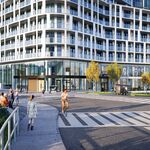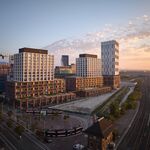Memph
Active Member
What makes you think so many of the City of Toronto employees live outside Toronto? I think something like 60-70% of people with jobs in Toronto live in Toronto.
It's not punishing anybody, it's not a bad idea, nor is it aimed at 905ers. It's just a way for Toronto to gain a needed revenue tool. Nothing more. Other cities do this. It can be worked into the next CBA, and TO would get, I dunno, $30-50M every year. It's a small wage tax, and its main purpose is to recoup the costs of infrastructure and services people aren't paying for. IMO it's a helluva lot better than one-sided ideas like placing tolls on our highways.
I've worked for the City, I read the news, I know how systemic the issue of municipal workers' non-residency is. So what's the point of paying-out exorbitant salaries for no other reason than TO's high cost of living when the majority of our employees don't live here and commute from 100km away?
Oh Jesus Christ, just what we need, another bad idea aimed at punishing 905ers. Good luck with that.
This is the problem, people seeing a realistic funding source - and rejecting it by making false claims and not actually reading it.
The tax is only on municipal workers (either initially, or outright) - these jobs are necessary and will not result in businesses/private sector jobs leaving. And yes, "905ers" can very well place a tax on their non-resident municipal workers...I don't see why they couldn't or shouldn't. IMO it's a very sensible way to maintain a solid taxbase, reduce congestion, and promote intensification and increase land values. Regardless, municipalities throughout the 905 do not offer exceptionally high wages for no other reason than their city's high cost of living.
Simply putting a toll on the Gardiner and DVP is a one-sided approach that puts the burden on a specific group. The approach I mentioned doesn't care if people take GO, TTC, drive on highways or side streets, rollerblade, walk, skateboard, crawl etc.
All municipalities hire people based on merit, not address...
...we are a region and promoting waring taxes between component muncipalities of this region is not going to solve regional issues.....aside from the fact that your estimation that the majority live outside the city seems based on two guys you knew who lived far away from where they worked?
I prefer to look at the positive side of this story: at least politicians in the 905 are talking about the need for additional funds for transit expansion, even if they are questioning the plan itself.
http://www.thestar.com/news/gta/tra...akville_big_questions_about_the_big_move.html
Like I said when I posted it above, the final paragraph is concerning to me as it moved the theme of the piece (IMO) into the same old "what's in it for us" territory.
I think he makes a fair point. If Toronto isn't willing to pay for transit improvements anywhere, whether it be Toronto or Oakville, then why should Oakville be expected to pay for both Toronto and Oakville? Why should Oakville pay extra on behalf of Toronto? If everyone in the GTA contributes, then everyone would have to pay less.
So it's simple: if the 905 are the only ones paying extra taxes and tolls for transit expansion, then transit expansion should only be for the 905. If I have to pay double the taxes because Toronto opts out, then I don't want any of that money going to Toronto.
His "$1,000 per taxpayer" estimate though, was based on everyone paying....and, as I said, he had me interested right up until he said that (to paraphrase) all Oakville needs is the electrification of the Lakeshore West line....and that should not cost $1,000 per person.....so (IMO) he turned an whole piece that had been about a regional issue/plan into a "what's in it for us".




